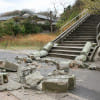Casualties of earthquake
It is with a heavy heart that we offer our sincerest condolences to the families of those who have lost their dear ones during a devastating earthquake in southwestern Japan. The 6.2 richter magnitude earthquake, which knocked down buildings, destroyed roads and cut power supplies, killed at least nine persons and injured around 1000. With search operations still ongoing, it is feared that the casualty figures will only increase. We can only hope that the worst is over for the people of Japan.
Closer to home, an earthquake on Wednesday evening, which originated in Myanmar, jolted us Bangladeshis – and hopefully our policymakers, too. Although no casualties were reported, the earthquake reminded us, once again, of the precarious situation of many of our densely populated urban areas, with poorly and illegally built structures on low lands that will not survive an attack of the magnitude that hit Japan or Nepal last year. Wednesday's earthquake alone tilted nine buildings; we can only imagine how many more such at-risk buildings there are around the country. The government does not seem to be doing nearly enough to identify these structures, make necessary structural adjustments, and ensure enforcement of the national building code. It is unfortunate that we are yet to adopt a national strategy of how to go about instituting building standards.
Dealing with the aftermath of an earthquake requires a multi-sectoral emergency response necessitating coordination between different bodies, from rescuing victims to providing medical care, from switching off the gas and power supplies to systematically removing the debris. Without any delay, we need to put in place a contingency plan in case of a destructive earthquake and designate a body that can command, control and coordinate the search and operations of different government agencies such as to minimise casualties.

 For all latest news, follow The Daily Star's Google News channel.
For all latest news, follow The Daily Star's Google News channel. 








Comments